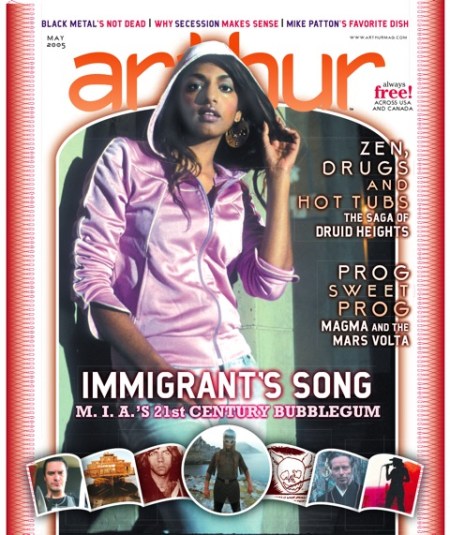Originally published in Arthur No. 16 (May, 2005)

BOMB POP
Born in war-torn Sri Lanka and bred in London, rising star M.I.A.’s pop instincts, radical consciousness and proudly pan-ghetto sound have no easy origin. As the defiant singer/MC explains to Piotr Orlov, it’s both where she’s from and where she’s at. Cover photo by W.T. Nelson.
“The mask is the face.” – Susan Sontag, “On Style”
“I don’t have a side, I’m spread out but I’m a mile wide/I got brown skin but I’m a west Londoner, educated but a refugee” – M.I.A., “MIA”
What, if anything, do we look for in a “pop” star worth supporting? Or more to the point, what are we willing to put up with, besides some gratuitous chart-topping populism and the 15-minutes of media-saturated intrigue, of course? Do we have any right expecting pop stars—not to be confused with musical artists whom luck, trends, circumstance or one great tune propels towards the mainstream—to influence a greater cultural conversation? Pop is, after all, the most powerful global transmitter of ideas in the information age, receiving over the past fifty years equal credit for the democratic tilt of history (Ted Turner’s comment that Western cultural export helped bring down the Berlin Wall) and civilization’s moral decline (Elvis, Madonna, Gangsta Rap, et al.). So, what effect can be brought about by a beautiful young woman whose looks and dance moves, globally minded outlook, state-of-the-art sonics, and spirited attitude recall any number of recent kiddie-pop models—yet whose life experience is based not on driving-towards-stardom dreams and Mickey Mouse Club auditions, but a mix of Third World civil war fatigue and immigrant struggles, Western art-school opportunity and hip-hop generation rebellion, independent experience and mod cons?
Meet Maya Arulpragasam, a 28-year-old Sri Lanka-reared, London-educated singer/MC with the stage-name M.I.A., who is approaching her pregnant pop moment, that inexplicable period when a confluence of fates—real and manufactured, critical and social, art and market—align to create sensations, and, at times, freak cultural anomalies and paradigm shifts. Since late 2003, she’s released a steady stream of dancehall-meets-hip-hop-meets-pop singles (“Galang” and “Sunshowers” being the most prominent) and one mix-tape (“Piracy Funds Terrorism, Vol. 1,” co-produced by Philly DJ wunderkind Diplo), blowing up via underground and Internet delivery systems (MP3 bloggers adore her), setting record companies frothing trying to pick up the rights to her debut album, Arular. (One succeeded: The album has just been released by the indie XL, but will soon be worked by Interscope.)
Continue reading